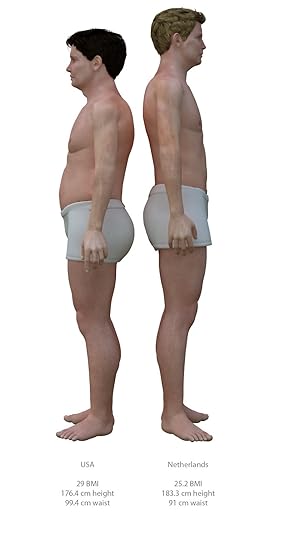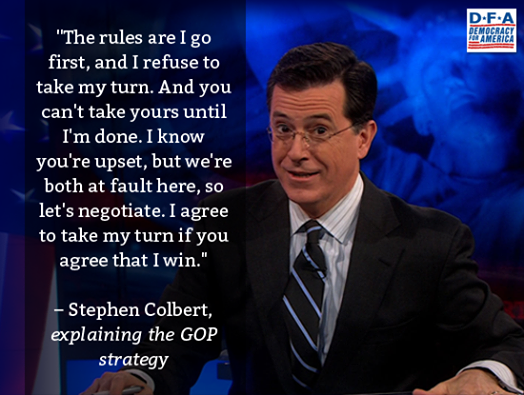Bodhipaksa's Blog, page 28
October 13, 2013
Avatars of the average US white male and the average Dutch white male back to back

Avatars of the average US white male and the average Dutch white male back to back.
The average Dutch man is six feet tall, and that figure is growing.
The average US male is three inches shorter (and overweight), and his height has been stagnant for a generation.
Average stature is an important indicator of a country's health care, nutrition and standard of living.
This post has been reshared 1 times on Google+
View this post on Google+
Related posts:
"The rules are: I go first, and I refuse to take my turn
A Buddhist View of Health Care Reform
The end of health insurance companies?
Related posts brought to you by Yet Another Related Posts Plugin.

October 12, 2013
Even Ross Douthat is disgusted with the Republicans.

The Kurtz Republicans
Looking in vain for a method to the shutdown madness.
Related posts:
Good Republicans
Shades of Hari Seldon!
Pennsylvania Republicans Send False Anti-Obama E-mail
Related posts brought to you by Yet Another Related Posts Plugin.

The soaring cost of a simple breath
Pulmicort, a steroid inhaler, generally retails for over $175 in the United States, while pharmacists in Britain buy the identical product for about $20 and dispense it free of charge to asthma patients. Albuterol, one of the oldest asthma medicines, typically costs $50 to $100 per inhaler in the United States, but it was less than $15 a decade ago, before it was repatented.

The Soaring Cost of a Simple Breath
The high price of commonly used medications for conditions like asthma contributes heavily to health care costs and certainly causes more widespread anguish.
Related posts:
Why does a salad cost more than a Big Mac?
My new CD: The Wisdom of the Breath
Review of “The Wisdom of the Breath”
Related posts brought to you by Yet Another Related Posts Plugin.

"The rules are: I go first, and I refuse to take my turn

And you can't take yours until I'm done. I know you're upset, but we're both at fault here, so let's negotiate. I agree to take my turn if you agree that I win."
–Stephen Colbert, explaining the GOP strategy.
Reshared post from +Susan Stone
This post has been reshared 2 times on Google+
View this post on Google+
Related posts:
What I did during the summer vacation I never had.
Improper turn signal use on the rise
Read this.
Related posts brought to you by Yet Another Related Posts Plugin.

October 11, 2013
Ladies and gentlemen: your modern Republican Party:
—Rep. William O'Brien, from my home state, New Hampshire.
Related posts:
Thank heavens for little loopholes
Lottery tickets and poverty
Related posts brought to you by Yet Another Related Posts Plugin.

October 10, 2013
Can you spare a few bucks to help some of the lowest income Buddhists in India attend…
[image error]
Dhammachari Vipulakirti is fundraising on JustGiving for FWBO (Dhammaloka)
Help Dhammachari raise money for this great cause.
Related posts:
Wildmind Buddhist Meditation » Top 10 celebrity Buddhists
Buddhists battle residents over temple development
FWBO News site
Related posts brought to you by Yet Another Related Posts Plugin.

Some people seem genetically programmed to look on the dark side…

Genes Predispose Some People to Focus on the Negative – Association for Psychological Science
Home · Join/Renew · Benefits · Teaching · Students · Books · Psychological Science Links · Donate · Convention · 2013 Program · Registration · Hotel · Travel · Call for Submissions · Press · FAQs · Program Committee · Archive · Exhibiting · Journals · Psychological Science · Current Directions …
Related posts:
The dark side of meditation
Fake Buddha quote: “We’re the same as plants, trees, other people, the rain that falls. We consist of that [which] is around us, we’re the same as everything.’
I love Google+, but… In the last 6 days one of my articles has been visited by 19,264 people fr…
Related posts brought to you by Yet Another Related Posts Plugin.

Self-hatred, self-compassion, and non-self
 A lot of people have difficulty practicing self-compassion, but some people have difficulty with the concept of self-compassion. I’ve had very experienced Buddhist practitioners tell me that while they think it’s good to have compassion for others it’s not desirable or even possible to have self-compassion, or that self-compassion is just self-pity. It’s a shame there’s so much confusion over such a crucial practice.
A lot of people have difficulty practicing self-compassion, but some people have difficulty with the concept of self-compassion. I’ve had very experienced Buddhist practitioners tell me that while they think it’s good to have compassion for others it’s not desirable or even possible to have self-compassion, or that self-compassion is just self-pity. It’s a shame there’s so much confusion over such a crucial practice.
But in some ways it’s not surprising that this confusion exists. The Buddha just took it for granted that we love ourselves — he said we should love others as we love ourselves, which for self-loathing westerners seems the wrong way around — and as far as I’m aware he never addressed the problem of self-hatred, which people say is largely a modern, western phenomenon, although I’m not sure there’s any evidence of that. Anyway, there’s little to nothing in the Buddhist scriptures about the practice of self-compassion or even self-metta.
Dealing with those objections, I see the issue of self-compassion versus compassion for others, or self-hatred versus hatred of others as a red herring. Hatred is hatred. So hatred of oneself, or parts of oneself, should be dealt with in the same way as hatred for others. And compassion for oneself should be cultivated in exactly the same way that compassion for others should be cultivated. So when the Buddha says something like:
“You should train yourself thus … ‘I shall remain friendly and empathetic, with a mind of lovingkindness, and I shall not give in to hatred,’”
this is as applicable to ourselves as it is to others. When the mind is full of compassion it touches everything it experiences with compassion. And this applies to reflexive thought — when the mind full of compassion thinks of itself it does so compassionately. How could it do otherwise?
This is a teaching of non-self. The perception of pain is just the perception of pain. If you experience pain in another or in yourself there’s not any essential difference regarding how you should respond: your pain, another’s pain — it doesn’t matter. And the only appropriate and skillful response to the perception of pain is compassion. It doesn’t matter whether the pain you’re perceiving is in yourself or another, you should meet the pain with compassion. This is where the non-self perspective comes in. “Your” pain isn’t really your pain.
There’s an interesting dialog in the Samyutta Nikaya, where the Venerable Moliya Phagguna asks the Buddha the simple question:
“Lord, who feels?”
The reply is very interesting: “Not a valid question,” the Blessed One said. “I don’t say ‘feels.’ If I were to say ‘feels,’ then ‘Who feels?’ would be a valid question. But I don’t say that. When I don’t say that, the valid question is ‘From what as a requisite condition comes feeling?’ And the valid answer is, ‘From contact as a requisite condition comes feeling. From feeling as a requisite condition comes craving.’”
So suffering, which is a feeling, arises, but it’s improper to say that there is a person who suffers. There is suffering but there is no sufferer. This is hard to understand without having seen through the illusion of self, but if we want to move toward directly seeing the truth of non-self we shouldn’t get caught up in thinking that our own suffering is any different from other people’s suffering.
We often, though, think either that our suffering is more important than others’ because it’s ours, or that it’s less important because it’s ours. Both of these are examples of what Buddhism calls “conceit” which includes not just thinking that we’re more important or better than others (so we’ll hurt people to relieve our own suffering) or that we’re less important or worse than others (so we’ll give compassion to anyone but ourself).
Self-pity is entirely different from self-compassion, incidentally. Self-pity is where you’re causing yourself further suffering by going “Oh, this is terrible. This shouldn’t be happening.” With self-compassion you let go of those story-lines and simply feel compassion for your pain. You send it loving attention. You hold it in awareness the same way you might hold a sick child. You give yourself comfort and reassurance.
Actually self-compassion is a bit of a misnomer. You don’t really have compassion for “yourself.” “Your self” is too large and vague a category; it’s hard to point to exactly what it refers to. You don’t really have a unified, stable, single entity called “your self.” “Your self” is an abstract category, and so you can’t really have compassion for it. What you can have compassion for is your pain, or the part of you that is suffering (which is inseparable from the pain). It’s the experience of suffering that is the object of self-compassion. The experience of suffering is more concrete. There is feeling, but no one who feels.
So this is my practice: when I’m experiencing pain I notice as best I can where it is in my body (even emotional pain is experienced in the body) and I send it my love. I send it my kindly attention, and drop phrases into the mind like “May you be well; may you be free from suffering.” But you could just as easily describe the intention as “I shall remain I shall remain friendly and empathetic, with a mind of lovingkindness, and I shall not give in to hatred (or self-pity).”
Related posts:
Sorrow is failed compassion (Day 28)
Cultivating compassion (Day 26)
Compassion as an antidote for our own suffering (Day 45)
Related posts brought to you by Yet Another Related Posts Plugin.

Poor Malcolm

The pseudo-profundity of Malcolm Gladwell
Gladwell is a brilliant salesman for a certain kind of cognitive drug. He tells his readers that everything they thought they knew about a subject is wrong, and then delivers what is presented as a counterintuitive discovery but is actually a bromide of familiar clichés.
Related posts:
"The rules are: I go first, and I refuse to take my turn
What I did during the summer vacation I never had.
Ladies and gentlemen: your modern Republican Party:
Related posts brought to you by Yet Another Related Posts Plugin.

October 9, 2013
Read this.
Reshared post from +Matthew Inman
A new comic.

Christopher Columbus was awful (but this other guy was not) – The Oatmeal
A note from the author: All of the information in this essay came from A People’s History of the United States, by Howard Zinn, and Lies My Teacher Told Me, by James W. Lowewen, both of which uses primary sources such eyewitness accounts, journal entries, and letters from Christopher Columbus …
Related posts:
Interesting things I read today
"The rules are: I go first, and I refuse to take my turn
Thanks for the mention
Related posts brought to you by Yet Another Related Posts Plugin.




